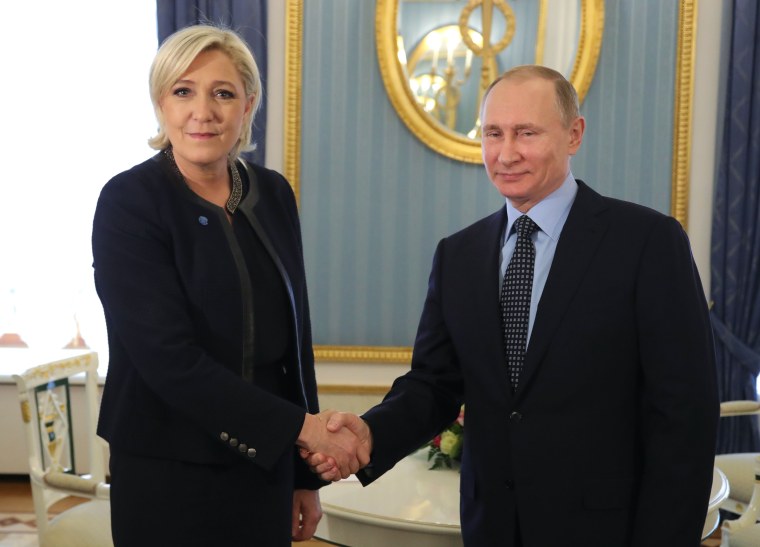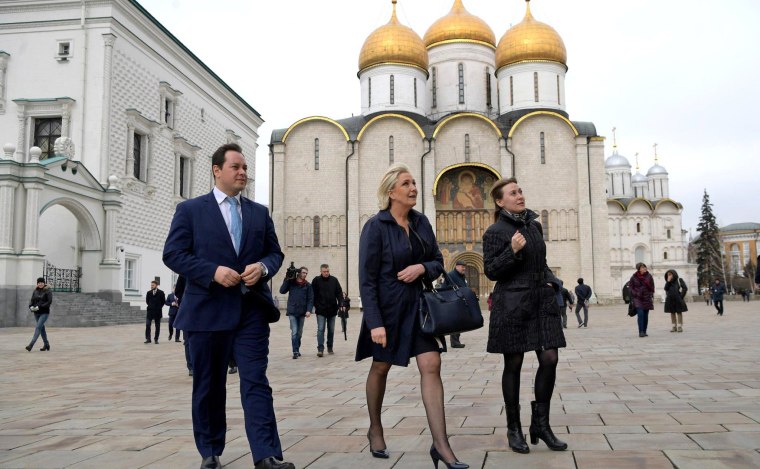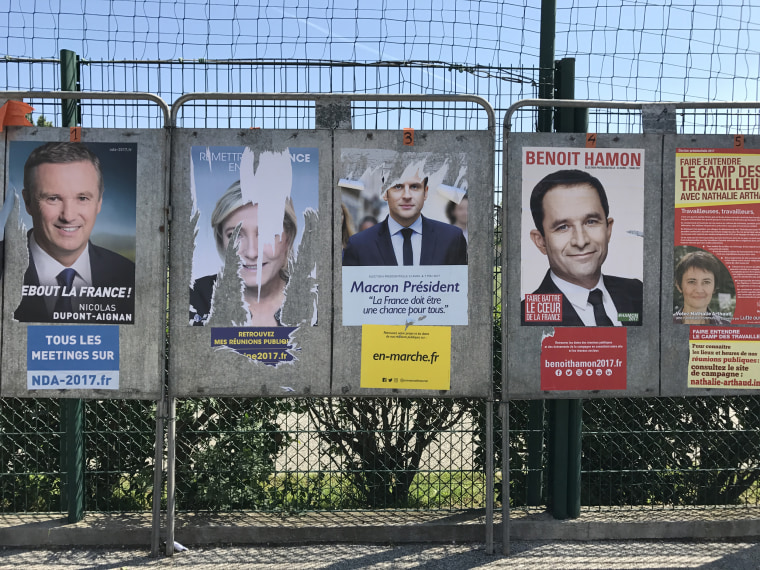As voters in France prepare for their presidential election Sunday, U.S. officials are warning of Russian interference in the hotly contested race, saying that the tactics being used are similar to those deployed in the 2016 U.S. presidential election.
The warnings come as congressional investigators and intelligence agencies continue to look at Russian interference in the 2016 U.S. presidential election and any role Donald Trump’s campaign played in Russian interference.
Specific concerns are being raised about the dissemination of false news stories, allegations of computer hacking against a leading candidate opposed by the Kremlin and slanted coverage of the French elections by Russian news agencies.
“I think it's safe to say by everybody's judgment that the Russians are actively involved in the French elections,” said Sen. Richard Burr, the top Republican on the Senate Intelligence Committee. Burr's committee is currently investigating Russian interference into the U.S. elections and potential collusion between Donald Trump’s campaign and Putin allies in Russia.
Sen. Mark Warner, the top Democrat on that committee, who receives the same classified intelligence briefings, said at recent Senate hearing: “French presidential candidates right now have been the subject of Russia propaganda and disinformation.”
Voters this weekend will vote on eleven candidates in the first round of the election, with the top two vote-getters advancing to the second round on May 7. Russian president Vladimir Putin has expressed support for right-wing nationalist Marine Le Penn and Americans familiar with the intelligence around the election say that the Kremlin is both overtly and covertly working to ensure their preferred candidate wins.
U.S. Congressional investigators have warned of Russian involvement in France. While they have not provided specific evidence, they’ve pointed to tactics U.S. intelligence officials have said were used in the U.S. elections — including the dissemination of fake news, social media bots that spread misinformation and the hacking and release of information of political entities, including the Democratic National Committee and Hillary Clinton’s campaign.
Related: Putin Meets Marine Le Pen in Moscow, Denies Election Interference
Le Pen’s proposed policies align closely with Russia’s values and geopolitical goals. Her party, the National Front, received a loan from a Russian bank, First Czech Russian Bank, which is owned by a Putin confidant, to fund Le Pen’s campaign. She said she was unable to obtain a loan of 9 million Euros from western banks.
Le Pen also traveled to Russia last month to meet with Putin and a photograph of the meeting was released to the press from the Kremlin. She has gone to Russia several times to meet with members of the legislature.

“We don’t want to influence in any way the events going on [in France], but reserve our right to communicate with all representatives of the country’s political powers, as our partners do in Europe and in the U.S.,” Russia’s spokesperson told journalists at a press conference following the meeting between the two leaders.
Le Pen touts pro-Russian policies, including her opposition to NATO, a retreat from the European Union and support of Russian intervention in Syria.
But Le Pen is not the only candidate to express similar, pro-Russian views. Far-left candidate Jean-Luc Melenchon and center-right candidate Francois Fillon are skeptical of EU sanctions against Moscow and have supported the Russian intervention in Syria.
The only outlier among the leading contenders is centrist candidate Emmanuel Macron, who says the European Union should stand firm against Russia and its interference in the election process.
In February, Macron’s campaign manager said they were targets of concerted Russian attacks and accused Russia of trying to influence the outcome of the May election.
Related: Facebook Shuts Down Fake Accounts in France Ahead of Election
“There are hundreds if not thousands of attacks on our computer system, our database and our sites, and by chance this happens to come from the Russian border,” Ferrand, a Socialist MP, told France 2 TV. “We want a strong Europe. That’s why we are suffering from attacks from several information sites belonging to the Russian state.”
"We will not accept any interference whatsoever in our electoral process, whether by Russia or any other state," said Foreign Minister Jean-Marc Ayrault.
"After what happened in the United States, it is our responsibility to take all steps necessary to ensure that the integrity of our democratic process is fully respected," he told parliament.
The Kremlin denied claims that Russian hackers have been targeting Macron.
And at least one influential French intelligence expert, however, doesn’t think that Russian is interfering in the elections. Eric Denece, director and founder of the French Center of Intelligence Research, said that “there is no serious proof” that Russia is behind the hack into Macron’s campaign and pointed to potential U.S. involvement in any effort to destabilize the election.
Hacking threats during the French election is not new. In 2012, the U.S. hacked into the computers of several senior French officials at president Nicolas Sarkozy's office days before the second round of the elections.
“CIA or people in intelligence are absolutely capable of carrying out a cyber-hack as if it is Russian,” Denece told NBC News.
But American intelligence experts say that Putin has a long history of working to influence electoral outcomes dating back decades, including Soviet efforts to destabilize European politics in the 1980s.
Erik Brattberg, director of Europe studies at the Carnegie Endowment, said that while Putin’s involvement is more overt, the covert tactics in France are similar to those used more recently.
"Russia is following the playbook they used in the U.S. Elections in 2016," Brattberg said.
To combat bots and fake news, Facebook has announced that it is cracking down on fake accounts spreading disinformation on French politics, shutting down 30,000 accounts. Facebook and media companies are running fact-checks on fake posts and tamping down on accounts with the largest footprint.
In the U.S. elections, Putin-backed media outlets RT and Sputnik had an obvious slant against Democratic candidate Hillary Clinton. They posted Wikileaks’ release of the DNC’s emails before they were released and wrote negative stories about the former Secretary of State.

In France, Russian state-controlled media outlets, especially Sputnik, are, writing positive stories about the Russian preferred candidates Le Pen and casting a more negative light on Macron.
One headline from this week says, “Macron Denies Allegations on Hiding Sources of Income, Offshore Accounts.” A positive story on Le Pen notes her resolve to break with the European Union and NATO.
Far-left candidate Melenchon has risen in the polls in recent days, raising questions about the accuracy of polling that might be unable to capture the true mood of the electorate.
Clint Watts, senior fellow at the Foreign Policy and Research Institute and NBC contributor, said that regardless of if one of the pro-Russian candidates win, Russia’s influence will be felt.
“They’ve still fragmented the electorate,” Watts said. “You now have an angry population that undermines the mandate of the winner and they’re now supporting Russian positions.”
It’s unclear if the United States is launching its own investigation into Russian activity in France. No member of the Trump administration has condemned — or even acknowledged the tactics.
“Russian-backed measures are predominantly anti NATO, anti EU and anti-immigration, so it makes it really hard to counter when you’re also repeating some of those policies,” Watts said of the Trump administration, which also ran a campaign on those three policy platforms.


